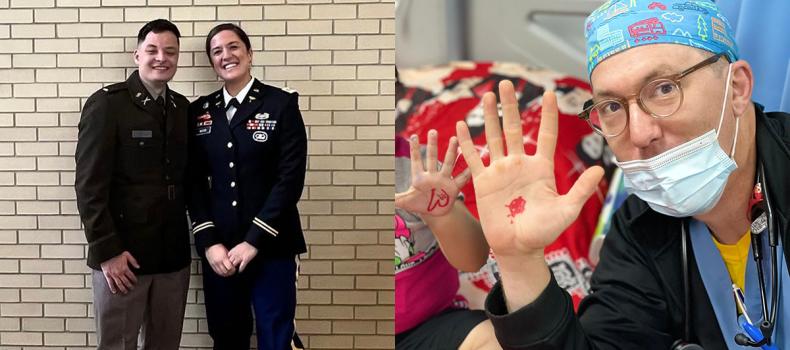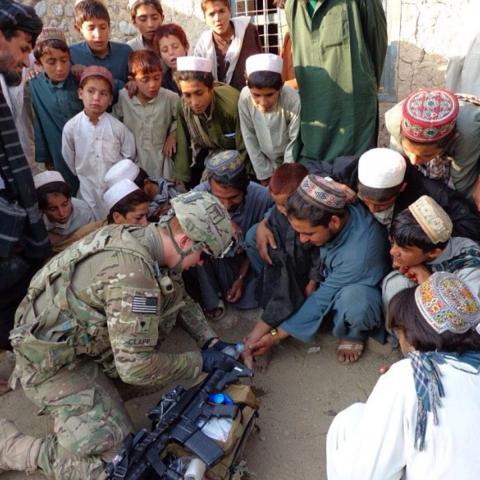On Veterans Day, the country reflects on the services of those who have served in the United States Armed Forces.
The Frances Payne Bolton School of Nursing has a long history of educating nurses who have previously served or go on to serve after graduation, and today we honor that legacy by highlighting a few of our current student veterans.
Olivia Wood
Master of Science in Nursing PNP (acute care/primary care) - Class of 2025
Doctor of Nursing Practice - Class of 2026
My name is Olivia Wood, and I was born and raised in northeastern Ohio. In 2015, I graduated from The Ohio State University School of Nursing while also completing the U.S. Army ROTC program. After graduation, I was commissioned into the Army Nurse Corps. Currently, I live in North Carolina with my fiancé and our two fur babies, and we’re planning to relocate back to Ohio next year. Although I am an ER nurse by training, my true passion has always been in pediatrics and humanitarian medical missions.
What branch of the Armed Forces did you serve in? Any notable service details?
I served in the U.S. Army Nurse Corps for nine years as an active duty nurse. In March 2024 I transitioned to the United States Army Reserves Nurse Corps. Throughout my time in the army, I have worked primarily as a trauma nurse. I have completed one combat tour to Afghanistan and supported many other missions at home and abroad.
How did you service inspire you to become a nurse?
Growing up in a military family in Ohio, joining the military always felt like a natural path for me. When I was a teenager, I fell in love with the field of medicine and helping others. There is truly no more rewarding experience than serving as a nurse for military service members and their families.
What experience do you bring as a veteran to the School of Nursing?
I believe that each of us brings a unique perspective to the School of Nursing, and mine is no exception. I aim to draw from my experience as a military nurse serving in underdeveloped countries and integrate it into my practice as a pediatric nurse practitioner. My goal is to provide compassionate care to the pediatric population and vulnerable youth of Ohio.
Zachary Clapp
Doctor of Nursing Practice, Anesthesia - Class of 2026
Clapp is a dedicated student nurse anesthetist with a background in neuroscience, pediatric critical care, and palliative care. Currently pursuing a Doctor of Nursing Practice in the Nurse Anesthesia program, he brings extensive experience in both clinical practice and humanitarian efforts, including work in Afghanistan, Uganda, Iraq, and most recently Guyana with the veteran organization Global Surgical Medical Support Group (GSMSG) in support of the U.S Department of State’s mission. His service has profoundly shaped his commitment to nursing and patient care as a veteran.
What branch of the Armed Forces did you serve in? Any notable service details?
I served in the U.S Army as a combat medic with the 101st Airborne Division. Notable achievements include being awarded the Combat Medic Badge during my deployment to Afghanistan.
How did you service inspire you to become a nurse?
My military service instilled in me a deep sense of duty and compassion for others, leading me to pursue nursing to provide care and continued support to those in need in low and middle-income countries/conflict zones.
What experience do you bring as a veteran to the School of Nursing?
As a veteran, I bring unique perspectives on resilience, teamwork, and the importance of holistic patient care, which I believe are essential in nursing. My work overseas has shown me that cooperation is both possible and achievable. In today’s current landscape, we must deepen and broaden our perspectives as human rights advocates to improve access to healthcare for those suffering from civil strife and lack of surgical capacity for children and other vulnerable populations.
What do you want others to know about your service or the Armed Forces in general on Veterns Day?
On Veterans Day, I wish for others to reflect on the sacrifices made by service members and the importance of developing robust support structures within academic programs for veteran students. Support, ideally, goes beyond acknowledgment; it includes active engagement from professors and institutions to facilitate the transition into academic life. Such structures are essential for fostering veteran success and resilience as we navigate educational journeys, both in and out of uniform.



